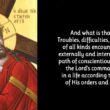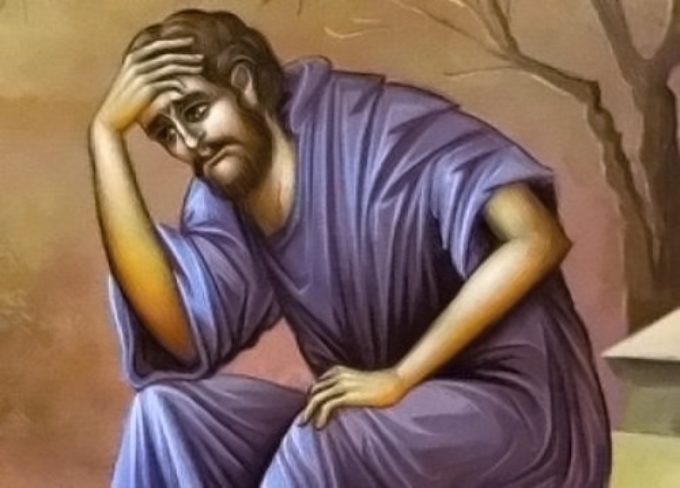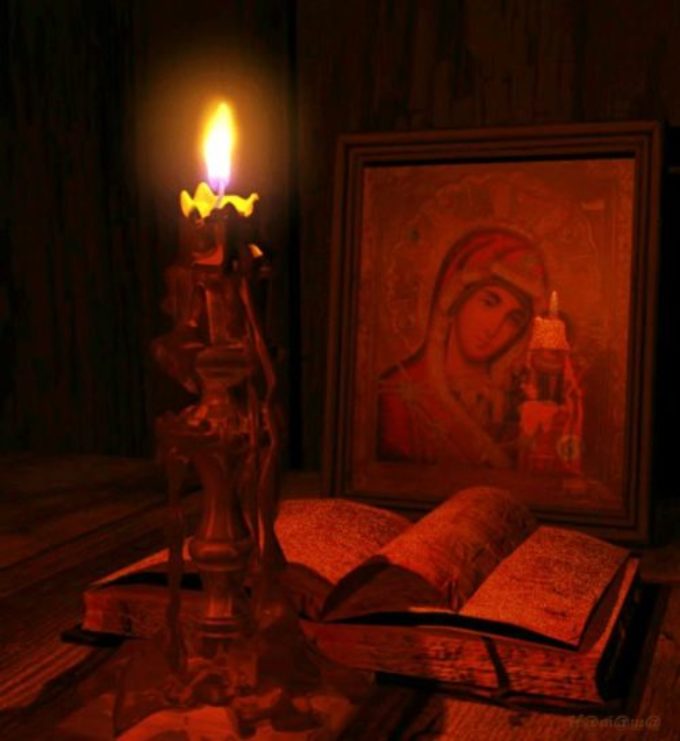The Holy Fathers of the Church say that selfishness is the root of all evils. Saint Gregory the Great calls it the king of all sins. The more you boast yourselves, the more we seek praise, honor and glory, the lesser you become before God Who mocks proud mockers but shows favor to the humble and oppressed [1]. Selfishness is the obstacle of all goods and the cause of all falls. For healing us of our selfishness, God lets us fall into greater sins, thing which the most wise doctor of our souls would not have allowed if our selfishness hadn’t been the worst of all. When king David boasted and said: I said in my sufficiency: I’ll never fall! God, for healing him, let him fall in adultery and murder. When saint Peter boasted when Christ warned the apostles that they would all fall away, saying with conviction: Even if all may fall away, yet I will not.[2] For his pride, God let him fall by denying Him thrice and then he humbled himself, cried and repented.[3]
But many other hermits of the desert, who banished demons from people, who made signs and miracles fell with divine permission in great sins, even in crimes and debauch, as we read in the Patericon, Lavsaicon, in the Life of the Saints and other patristic books. The man encounters many other slanders, troubles and pains, as well as physical diseases, for being freed of his pride. Saint Paul confesses avowedly: Therefore, in order to keep me from becoming conceited, I was given a thorn in my flesh, a messenger of Satan, to torment me.[4]
Therefore the fact that God allows such miseries to afflict the man, for smashing his stubborn pride, it proves that pride is the greatest and worst of all passions. And it’s not only the worst, but also the deepest rooted within ourselves.
That’s why when due to our hard struggle and to the divine grace the virtues would defeat all evils and would chase away all passions, pride would still remain there intractable and would torments the man till his death. This is what the pharisee from the parable suffered, though he had succeeded to gain many virtues but because he, the wretched, was proud of his devotion, was ultimately doomed.[5]
But why do we boast and despise the other people considering that they are supposedly inferior to us? Because of our wisdom? Because of our virtue? Because of our richness? Because of our beauty?
But all these are some divine gifts and blessings and we shall give account of them on Judgment Day. The more gifts we have, the more severely we’ll be judged.
Thus if in this life we were given more material and spiritual goods than the other people, we should be much more humble and grateful to God who gave them to us. Only the falls and sins are ours. If we want to boast with these, then we prove our folly and ignorance. But if we are rational people, we’ll see our unworthiness and wretchedness and we’ll humble ourselves with broken heart.
Likewise, we shouldn’t forget that selfishness is doomed not only in the other life but also in this life, where is hated by all people. Because there is no other more disgusting man than the envious. And he is always restless, willing to draw the interest of the people. If they don’t honor him, he gets upset, he quarrels with his kind, who envies each other and expect to be extremely honored.
Contrariwise, the humble one is loved by all, even if he has flaws. One like this defeats the evil by his patience, the angry by his gentleness, the selfish by his humbleness. God exalts the humble ones, not the ones who aspire after the high. He exalted Jacob above Esau [6] Joseph above his brothers [7], the tax collector above the Pharisee [8], poor Lazarus above the rich man [9].
But God exalted the most His only begotten Son and Word, our Lord Jesus Christ, who voluntarily humbled himself more than any other man. God being eternal, almighty and flawless deigned out of his great humbleness to be born in a cave, to be wrapped in the manger of the dumb animals, to live in poverty and unknown by anyone, to be despised, to wash the feet of his disciples, to be abused, whipped and ultimately to suffer the martyrdom of the death on the Cross, while being completely innocent. And he did all these for us, the guilty and sinful ones, for our redemption and salvation.
We should follow our Lord and hate selfishness and look for humility. We should seek to befriend with insignificant and humble people and we should not boast. We should seek the last place. We should avoid excess and falsehood in our clothing, in our nutrition, in all our physical needs. We should get content to have the bare necessities. We should follow in everything as much as we can our Lord, the Holy Mother of God and the Saints, who lived in absolute humility.
For the more are loaded the trees with fruits, the lower they bend their branches and in the same way the faithful servants of God, the more they gain His blessings and gifts, the humbler they are, knowing that this is their duty as long as the Lord said: So you also, when you have done everything you were told to do, should say, ‘We are unworthy servants; we have only done our duty.[10]
If God humbled himself that much, till death [11], how does the helpless man dare to have proud thoughts? Abel taught us innocence, Enoch taught us purity, Noah taught us magnanimity and hope, Abraham taught us obedience and to love strangers, Jacob taught us long lasting patience, Joseph taught us righteousness, Moses taught us gentleness, Job taught us endurance, David taught us to love our enemies, Elijah taught us the zeal for God and the Son of God taught us humility, for he tells us: and learn from me, for I am gentle and lowly in heart, and you will find rest for your souls.[12] God teaches us all virtues but he urges us the most to acquire this one, because it is the treasury of all the other virtues.
Source: Magazine « Pious Nikon »
[1] Proverbs 3, 34
[2] Mark 14, 29
[3] Mark 14, 66-72
[4] 2 Corinthians 12, 7
[5] Luke 18, 9-19
[6] Genesis 27, 27-28
[7] Genesis 47
[8] Luke 18, 14
[9] Luke 16, 19-31
[10] Luke 17, 10
[11] Philippians 2,8
[12] Matthew 11, 29









